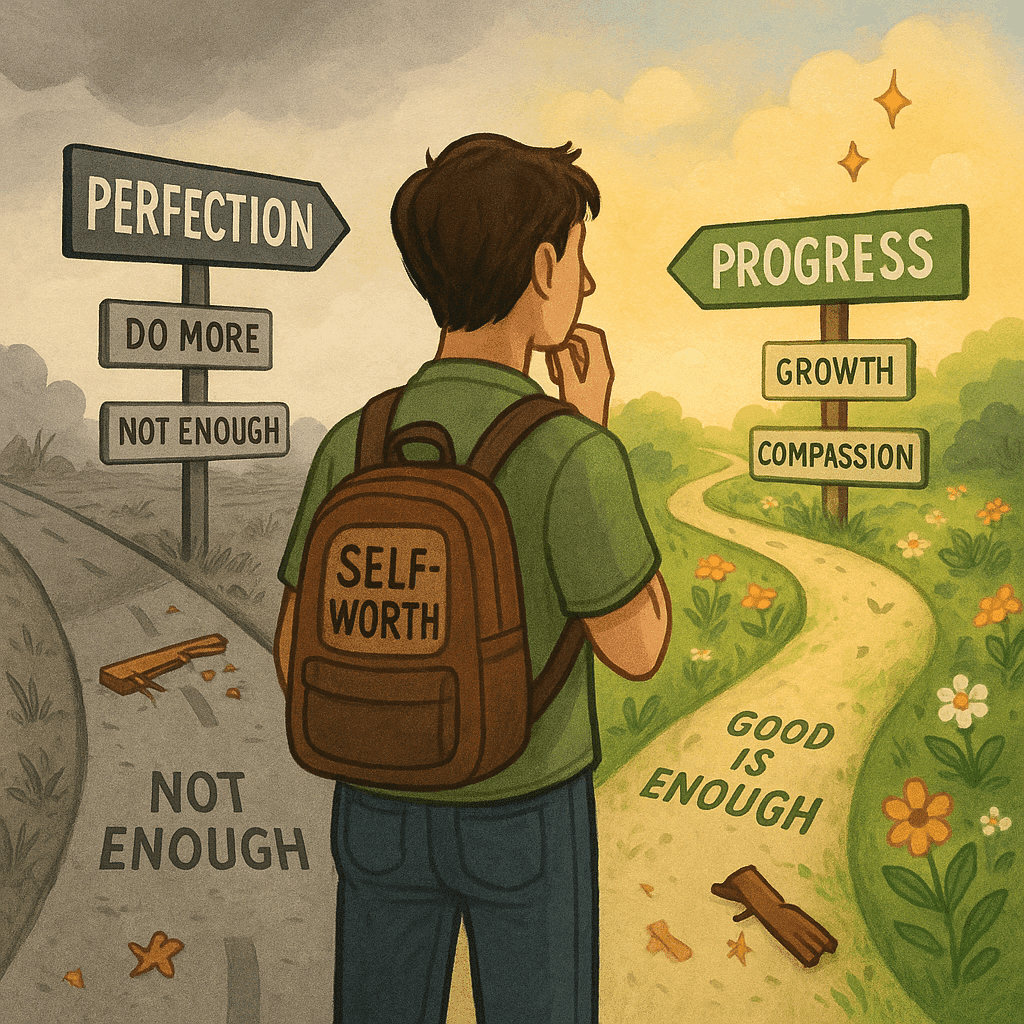
☘️ When Perfect Becomes the Problem: Unhooking Your Worth from Performance
🛡️Perfectionism Isn’t About Being Perfect—It’s About Being Safe
Most people who struggle with perfectionism don’t actually believe they are perfect.
They’re trying to avoid criticism, failure, or shame.
They’re trying to earn security through achievement.
In therapy, we often uncover that perfectionism starts as a protective response. It helps people feel in control in environments that feel unpredictable or high-pressure. Over time, this morphs into a belief that:
“If I get it right, I’m okay. If I fall short, I’m not enough.”
It becomes a mental loop—one that’s exhausting, emotionally rigid, and often invisible to others.
🧠 What Happens in the Brain
Perfectionism activates the threat system in the brain. When you anticipate failure, disapproval, or shame, your amygdala (the brain’s fear center) sends out a signal to protect yourself.
So you hustle. Over-prepare. Overanalyze. Avoid.
And it works—for a while.
But the cost is chronic tension, self-doubt, and burnout.
Therapy helps rewire this loop through neuroplasticity—the brain’s ability to form new pathways. As clients challenge perfectionistic beliefs and build self-compassion, their nervous systems learn to feel safe in imperfection.
⚖️ Healthy Striving vs. Perfectionism
Healthy striving is flexible. It allows for effort, growth, and rest.
Perfectionism is rigid. It says, “Do more. Be more. Don’t mess up.”
In session, we often explore this contrast by asking:
- What emotion is perfectionism protecting you from?
- Where did you first learn success = safety or worth?
- What would it mean to be valuable without achieving anything?
This work creates space for healing—not just behaviorally, but at the core of how you relate to yourself.
💬 A Thought That Resets the Bar
“Don’t let perfection be the enemy of good.”
— Voltaire
Perfectionism convinces us that “good” isn’t good enough. That unless something is flawless, it doesn’t count.
But this quote reframes the entire story:
What if peace, progress—even healing—only begin when we stop aiming for perfect and allow good to be enough?
In therapy, we often see how this belief plays out:
- Clients waiting for the “right” mood to rest, speak up, or take the first step
- People dismissing small wins because they didn’t feel big enough
- Quiet, internal growth getting overlooked—because it didn’t feel impressive
But good is where the real work lives.
Good is intentional, flexible, and sustainable.
Good is showing up imperfectly—and staying in the process anyway.
Let this be your permission slip:
Your progress doesn’t need to be perfect to be valid.
And you don’t need to be flawless to be deeply worthy.
♻️ The External Validation Trap
When we tie our self-worth to our achievements, we enter a never-ending cycle of seeking external validation, always trying to prove ourselves.
The problem is, external validation is often fleeting, unreliable, and out of our control. When we don’t achieve what we expect, we feel like we’ve failed—not just at the task, but as a person.
This is why it’s so important to develop internal validation—learning to accept ourselves for who we are, rather than only for what we do.
In therapy, this might look like:
- Practicing self-acknowledgment before external praise
- Naming your effort, not just your outcome
- Replacing “What will they think?” with “What do I know to be true about me?”
The goal isn’t to stop caring about results—it’s to stop tying your identity to them.
💼 How Therapy Supports Recovery from Perfectionism
Therapy helps people:
- Explore childhood beliefs about achievement and safety
- Learn to challenge black-and-white thinking
- Build language around needs, identity, and internal worth
- Practice nervous system regulation when facing imperfection
- Use self-compassion to build resilience instead of avoidance
You’re not broken for wanting to do well.
You’re allowed to aim high.
But therapy helps you do it from a place of grounded self-worth—not fear of falling short.
📚 Resources That Support This Work
- Podcast Episode:
🎧 The Mel Robbins Podcast – “How to Stop Letting Your Inner Critic Control Your Life”
Practical, science-informed tools for interrupting perfectionistic thoughts and building self-trust.
- Therapy Tip:
Write down one sentence your inner critic said to you today.
Then rewrite it as if you were speaking to a close friend.
This small shift can help rewire your internal narrative and support emotional safety.
📝 Reflection Prompt
Where did you first learn that your performance defined your worth?
What might it feel like to be enough—even when you’re not achieving?
Take a moment to write it down.
Then ask: What does progress look like if perfection isn’t the goal?
📣 Call to Action
If perfectionism is shaping how you see yourself—or keeping you stuck in a cycle of overthinking, burnout, or emotional fatigue—therapy can help.
At Refreshing Waters Counseling, we help people untangle their worth from performance—whether you’re a high achiever, a hidden striver, or simply exhausted from trying to hold it all together. Therapy is a space to quiet the pressure, reconnect with yourself, and heal in ways that last.
Explore our team and therapy options
Schedule a free consultation
Read more on our blog

Jillian LaDoux
Jillian LaDoux is a compassionate, creative, and skilled mental health professional committed to walking alongside clients as they navigate life's most vulnerable, transitional, and transformative moments. Her integrative and trauma-informed approach helps individuals move toward healing with insight, empowerment, and emotional resilience.
